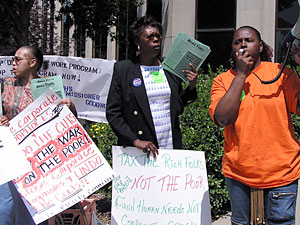|
Photos
Your Voice
|
Final phase of Minnesota welfare reform to affect half of new applicants
June 29, 2004
A new Minnesota program that starts on Thursday is designed to help people find work before going on traditional welfare. The diversionary work program will require welfare applicants to look for work for four months. They won't get a welfare check, but they will get help with rent, food and utility bills. The Pawlenty administration calls the program the next phase in welfare reform, but some advocates for welfare recipients say it will hurt low-income Minnesotans.
St. Paul, Minn. — The diversionary work program is the last piece of the welfare reform package Gov. Pawlenty proposed last year. The 2003 Legislature approved the program, and counties had until now to implement it. State Human Services Commissioner Kevin Goodno says the program is designed to help able-bodied people find work quickly before going on the welfare rolls.
"There's a large percentage of our population that come into our welfare programs that typically are ready to go back in the workforce; it's just a matter of finding the job. And this is geared toward them, and moving them out into the workforce as quickly as possible without it counting against their time limit," according to Goodno.
As part of welfare reform, recipients can only receive assistance for a total of five years during their lifetime. Goodno says the diversionary work program will also help identify recipients who face obstacles to finding work, such as a mental illness or limited English proficiency.
He says those people can be shifted to the state's welfare reform program, the Minnesota Family Investment program -- or MFIP. An average of about 1,300 families a month begin receiving assistance through MFIP, and Goodno estimates about half of them will be switched to the diversionary work program.
Some advocates for welfare recipients say the program is simply designed to discourage people who are eligible from applying for welfare.
The Welfare Rights Committee, which has opposed Gov. Pawlenty's welfare proposals and his budget cuts to some welfare programs, organized a protest of the new law outside the Hennepin County Government Center. Committee member Trishalla Bell says the diversionary work program -- or DWP -- punishes poor people.
"I call it 'die within poverty' because that's basically what it's going to do to families. This is what it does. It diverts families from being successful and getting out of poverty. It diverts families from cash," according to Bell.
Under the program, assistance will be funneled directly to landlords and utility companies, not to people in the program. Recipients can also qualify for food stamps, and their caseworkers will decide if they should receive cash of up to $70 a month.
The Welfare Rights Committee says that's discriminatory. Commissioner Goodno says the policy is simply discretionary, based on the needs of individual clients.
"As we have in our current system, we have people who are tougher with clients, and we have people who are more generous with clients. So there are going to be some variations, but as long as those variations are minor, I think that's acceptable. And it's expected," Goodno says.
Some organizations that work with refugees have also expressed concerns about how the program will affect the new wave of Hmong refugees arriving in Minnesota. Because the new families will likely live with relatives, they won't have landlords. If they're in the diversionary work program, they would receive food stamps and possibly cash assistance, but no money for rent.
Joel Luedtke, refugee director for the Minnesota Council of Churches, says the program probably won't help refugees move into the workforce.
"I mean, just the idea that these folks are going to be able to engage in an aggressive job search during these months when they're trying to find permanent housing, getting their social security cards, enrolling their kids in school for the first time, dealing with all the overwhelming aspects of adjusting to this culture and community - for most families, that's pretty unrealistic," Luedtke says
Luedtke says people who work with refugees tried to convince lawmakers to exempt refugees from the diversionary work program to no avail. He says he hopes the Legislature will revisit the issue next year.
Commissioner Goodno says he thinks many Hmong refugees will be switched to the MFIP program, rather than diversionary work, but Luedtke says he believes the vast majority of refugees will end up in the new program.
|
News Headlines
|
Related Subjects
|

